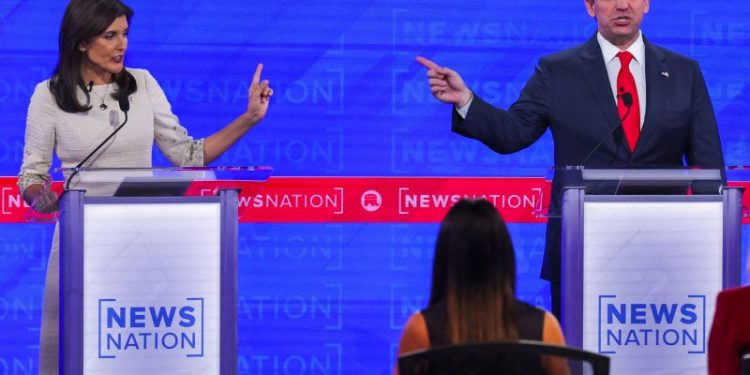“Showdown! 5 Highlights from Haley and DeSantis’ Dueling Town Halls
The recent political race has long been overshadowed by presidential campaigns and other high-level races. However, the power of local politics should not be underrated. This was especially true as debates for governor positions in Florida and Arkansas took place recently. On Thursday night, Governor Haley Barbour and Governor Rick DeSantis appeared in separate televised town halls, each aiming to address citizens across their respective states.
In Arkansas, Governor Barbour discussed his current plans for education reform, infrastructure improvements, and his work to making sure businesses re-open safely in the wake of the pandemic. He also addressed his controversial state tax cuts last year and highlighted what he believed to be their advantages.
In Florida, Governor DeSantis faced questions related to reopening the state, monitoring coronavirus hot spots, and his stance on climate change. He echoed statements made by President Trump, insisting there was no need to impose additional business restrictions since the previous ones implemented had worked thus far. He also addressed the fight against human trafficking and the current gun laws in the state.
Both town halls had a few things in common, and there were also several takeaways from each. Here are five major takeaways from the discussion.
First, governors need to be willing to address the issues that their state is facing. This has been an especially difficult issue in the wake of the pandemic, as governors have sought to both balance the health and safety concerns of their citizens, while still ensuring small businesses can remain open.
Second, governors should not be afraid to stand up for the policies they believe in. While Governor Barbour chose to defend his controversial tax cuts, even in the face of criticism from members of the public, Governor DeSantis firmly reiterated his commitment to standing with the President on a range of issues.
Third, governors need to be willing to engage with their constituents and address their questions and issues. Both Barbour and DeSantis had to answer difficult questions throughout the night, and this is an important part of any elected official’s communication strategy.
Fourth, compassion towards those affected by the pandemic should be a priority. While both governors had to address the economic consequences of the pandemic, they also expressed their commitment to providing assistance and resources to those who had been affected.
Finally, education reform should be taken seriously. Too often, larger conversations about education focus on federal issues. However, governors can have a significant impact on the quality of education in their states, and this is an area each of them showed a commitment to.
Overall, the town halls of Governor Barbour and Governor DeSantis highlight the importance of local politics and the role that governors can play in their states. While debates on larger issues will continue to occur, these town halls highlight the fact that governors have a tangible and significant impact on the everyday lives of their citizens.
The recent political race has long been overshadowed by presidential campaigns and other high-level races. However, the power of local politics should not be underrated. This was especially true as debates for governor positions in Florida and Arkansas took place recently. On Thursday night, Governor Haley Barbour and Governor Rick DeSantis appeared in separate televised town halls, each aiming to address citizens across their respective states.
In Arkansas, Governor Barbour discussed his current plans for education reform, infrastructure improvements, and his work to making sure businesses re-open safely in the wake of the pandemic. He also addressed his controversial state tax cuts last year and highlighted what he believed to be their advantages.
In Florida, Governor DeSantis faced questions related to reopening the state, monitoring coronavirus hot spots, and his stance on climate change. He echoed statements made by President Trump, insisting there was no need to impose additional business restrictions since the previous ones implemented had worked thus far. He also addressed the fight against human trafficking and the current gun laws in the state.
Both town halls had a few things in common, and there were also several takeaways from each. Here are five major takeaways from the discussion.
First, governors need to be willing to address the issues that their state is facing. This has been an especially difficult issue in the wake of the pandemic, as governors have sought to both balance the health and safety concerns of their citizens, while still ensuring small businesses can remain open.
Second, governors should not be afraid to stand up for the policies they believe in. While Governor Barbour chose to defend his controversial tax cuts, even in the face of criticism from members of the public, Governor DeSantis firmly reiterated his commitment to standing with the President on a range of issues.
Third, governors need to be willing to engage with their constituents and address their questions and issues. Both Barbour and DeSantis had to answer difficult questions throughout the night, and this is an important part of any elected official’s communication strategy.
Fourth, compassion towards those affected by the pandemic should be a priority. While both governors had to address the economic consequences of the pandemic, they also expressed their commitment to providing assistance and resources to those who had been affected.
Finally, education reform should be taken seriously. Too often, larger conversations about education focus on federal issues. However, governors can have a significant impact on the quality of education in their states, and this is an area each of them showed a commitment to.
Overall, the town halls of Governor Barbour and Governor DeSantis highlight the importance of local politics and the role that governors can play in their states. While debates on larger issues will continue to occur, these town halls highlight the fact that governors have a tangible and significant impact on the everyday lives of their citizens.










